Posts: 2,075
Threads: 20
Joined: Dec 2014
green question: How much priority does it make sense to put on land that holds strategic value, but is low quality?
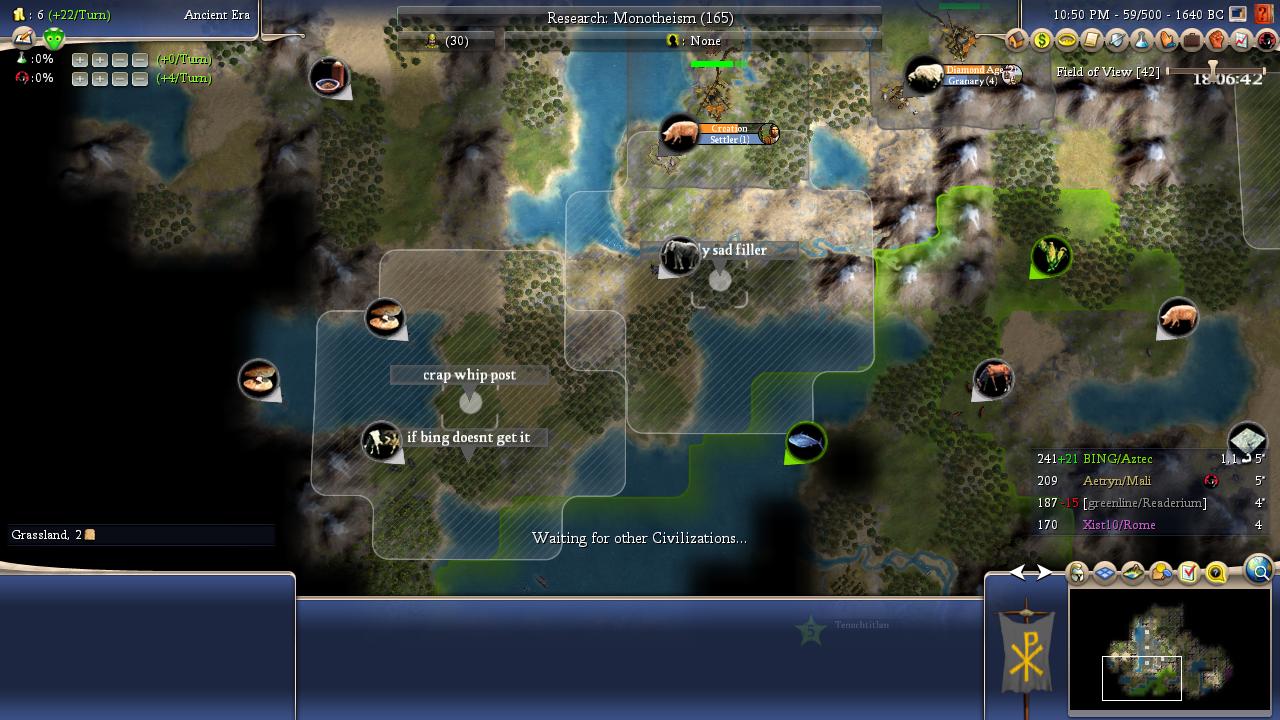
This finger of land seems like it would be important to hold if invading Bing, but at this stage of the game it has a really low return on investment compared to what I could be settling. The forward plant for the cows and clams will be hard to support without settling the ivory city first, but that would be completely foodless and useless. It doesn't seem worth pink dotting at all except for the ability to use it as a forward base.
Posts: 10,034
Threads: 82
Joined: May 2012
Heh, I've read Native Son, but not that one! It's also the name for a autobiography by perhaps the most well known Māori novelist, Witi Ihimaera, most famous for writing Whale Rider. A powerful story told around Māori legends in a spiral flow that makes for a great read. Doubt its widely available overseas, however.
Erebus in the Balance - a FFH Modmod based around balancing and polishing FFH for streamlined competitive play.
July 13th, 2023, 00:59
(This post was last modified: July 13th, 2023, 00:59 by Tarkeel.)
Posts: 4,577
Threads: 31
Joined: Nov 2016
(July 12th, 2023, 21:53)greenline Wrote: green question: How much priority does it make sense to put on land that holds strategic value, but is low quality?
IIRC there was some criticism of my settling Endor as a similar crap border fortress in PB58. I believe it does have some value to get strategic depth, but it shouldn't interrupt the snowball. I think those spots towards Bing might be better than the Equinox sites, but Nirvana should come first.
Also, feel free to disregard or rename my bad cityspot puns.
Posts: 2,075
Threads: 20
Joined: Dec 2014
More plain turns. Settler from Creation is on the way to the floodplains site. The next settler I think I may send towards the 'neads seafood' spot, but might be settled next to the corn instead just for defensibility. There is a spear in that area, and Republic will produce an axe once the settler is done to go in that direction.
A micro headache occurs:
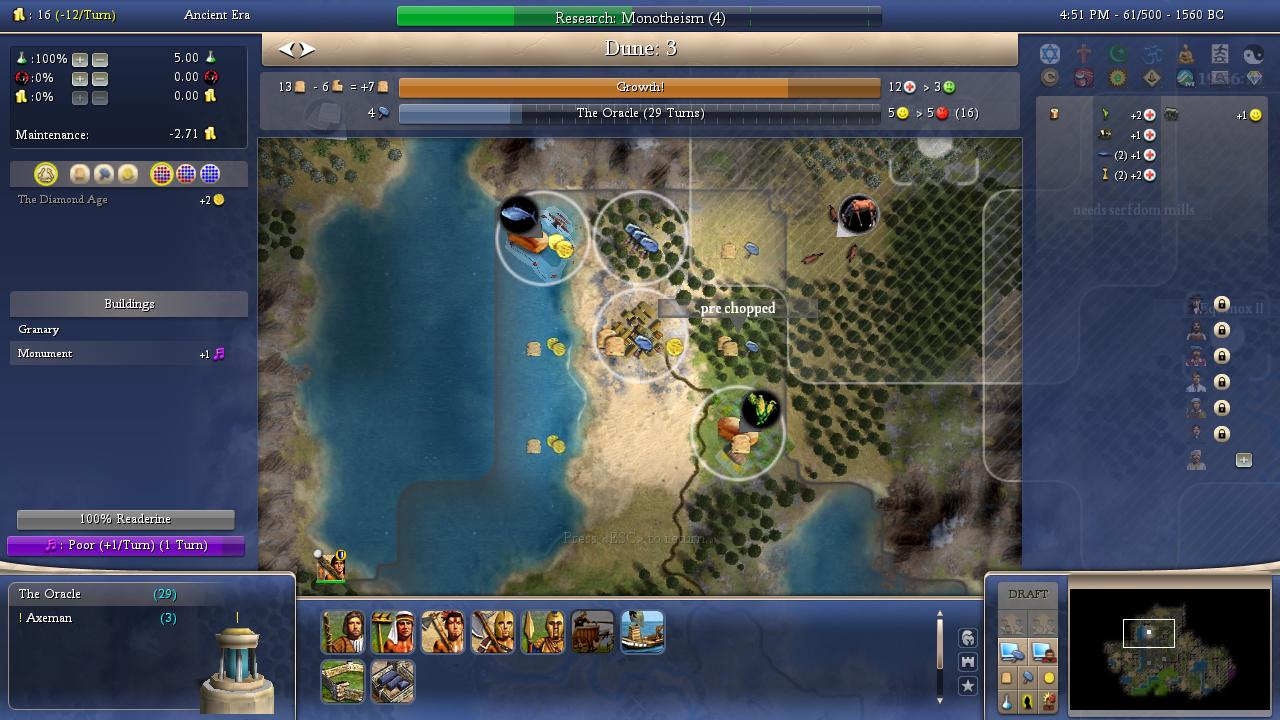
It appears that I whipped this city twice instead of once in the past dozen turns. I suppose this is where not having a spreadsheet tracking everything is biting me again. Given the city is going to grow into unhappiness, I'm not sure what the best move is here. Start another worker at size four?
Posts: 2,075
Threads: 20
Joined: Dec 2014
Don't have time for a detailed report tonight. Quick details:
Judiasm is down to a coinflip next turn.
Oracle is close to completion. Another chop and a whip will seal it.
Founded floodplains city.
Two more settlers on the way. Bing already is up to 6-7. Dude's a monster.
Posts: 4,577
Threads: 31
Joined: Nov 2016
(July 13th, 2023, 20:59)greenline Wrote: Two more settlers on the way. Bing already is up to 6-7. Dude's a monster.
This is Civac's trademark: Expand into a crashed economy, and then somehow manage to recover.
July 14th, 2023, 16:22
(This post was last modified: July 14th, 2023, 16:23 by greenline.)
Posts: 2,075
Threads: 20
Joined: Dec 2014
Alright, let's start with the gameplay stuff.
Good news is that we've landed Judaism, and we've gotten Oracle down to a coinflip:
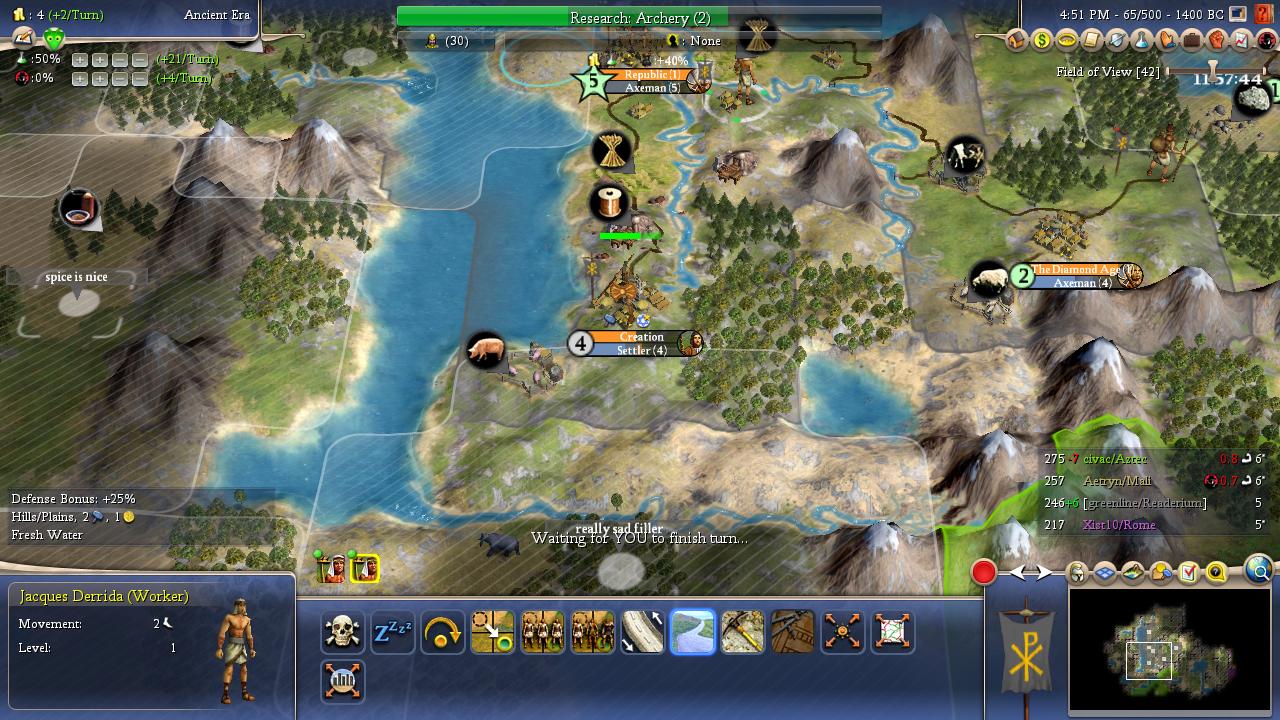
Not the best place for it to land, not the worst. This will be an eventual border city to Bing, so the extra cultural defence is good to have. The high hammer production in Creation will make it good for spamming missionaries in the near term. But I'd have preferred it popping up in one of the newer cities sans monuments.
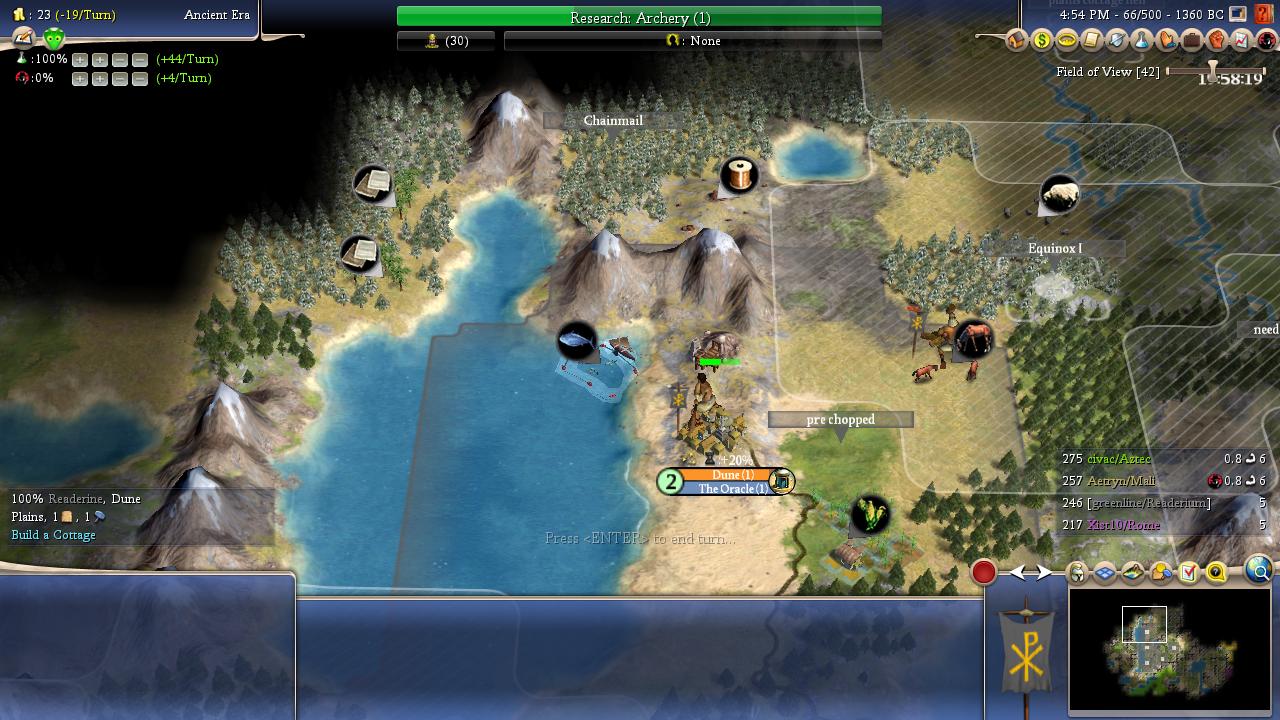
Getting this done on time meant abusing Dune a lot. There's around 30 turns of whip unhappy stacked, and most of the forests burned. The good news is that this city didn't have many good tiles to work anyway, and it can still be useful working the three resource tiles and pumping workers. The workers there on site will hook the horses up, and then depart for greener pastures (hah).
Oracle tech target is Monarchy. If we land it, the question I have is when is the best time to revolt. It will be a while before we get our first golden age. Sooner rather than later? When the current wave of settlers is finished and in transit?
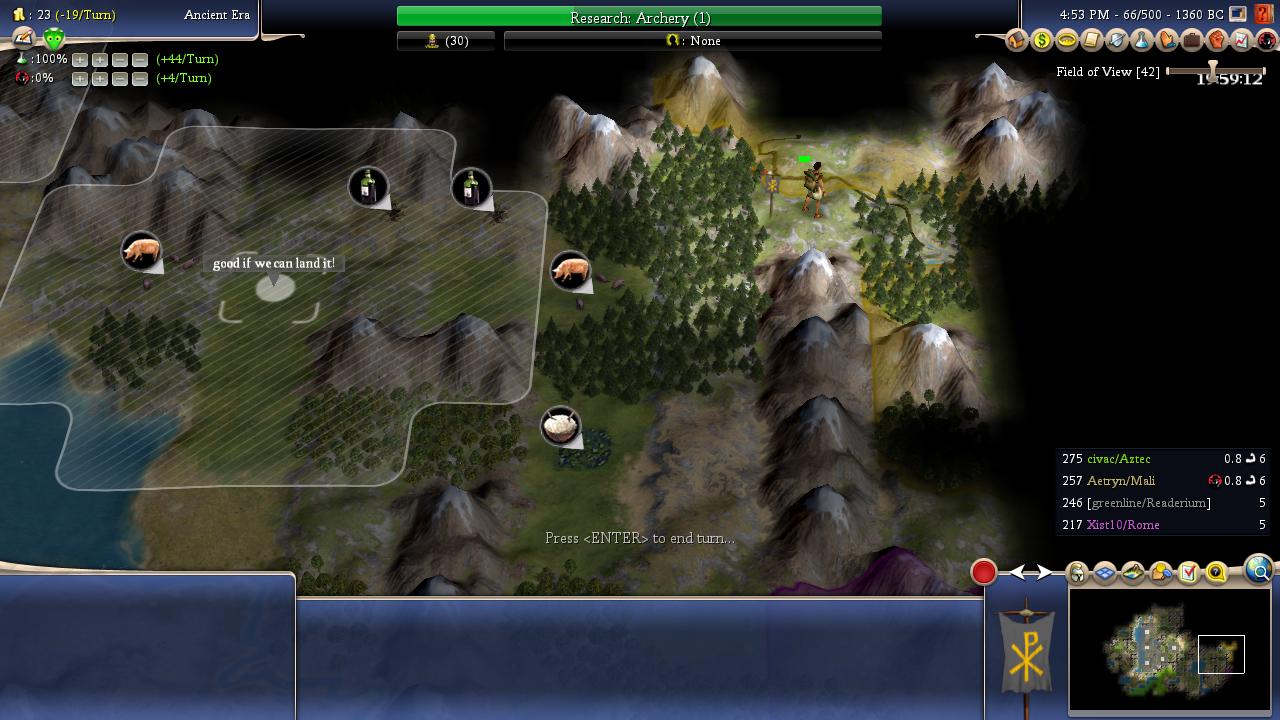
Further scouting in the east reveals Aetryn and Xist to be close neighbors. We'll probably border the two of them in this region eventually. Thankfully, the geography lends itself to having a natural chokepoint fortress. Xist was flashing a couple of axes nearby - glad I don't have to deal with that!
We have enough EPs to pick up Aetryn and Civac's graphs, shown below:
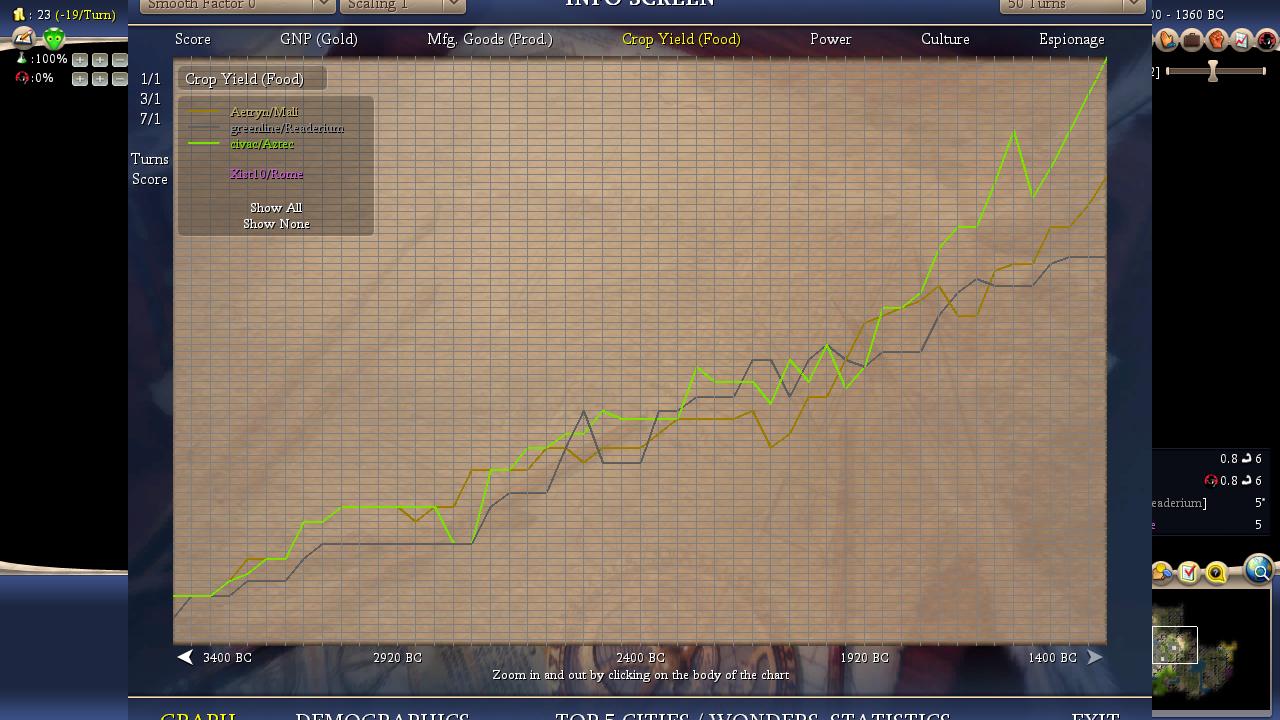
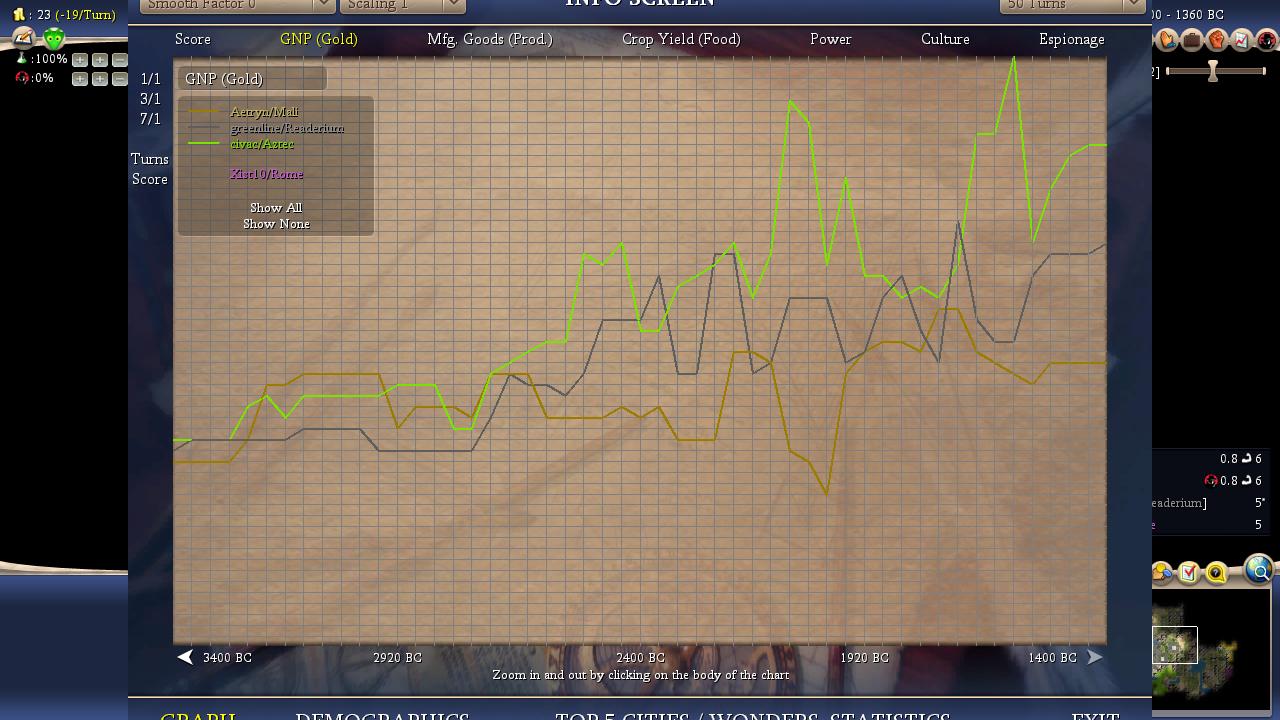
The CY graph is concerning. Although the demos suggest we are at least ahead of Xist, Aetryn leads by a fair margin, and Civac by a larger one. I hope that getting early monarchy and OR going can help stem some of the bleeding there.
The GNP graph is more interesting. Civac being at the top I suspect has some things to do with CRE culture - we are in second, despite only having a religious culture active this turn. I've laid down several cottages now. I wonder if other players are building early grass farms instead of cottages? Or is this just the PRO trade route bonus propelling us forward?
I feel a little better about our situation - we are about to settle a bunch of new cities. Then we will need another wave of workers to catch up with all those extra tiles. I am now seriously appreciating and missing the base BtS 25% worker boost. That would be a godsend here.
Next tech is archery - I want to have PRO archers available for happy reasons as well as cheap border garrisons. After that, I believe the way to go is straight Currency -> Guilds -> pain train.
July 14th, 2023, 16:58
(This post was last modified: July 14th, 2023, 17:03 by greenline.)
Posts: 2,075
Threads: 20
Joined: Dec 2014
(July 13th, 2023, 00:34)Qgqqqqq Wrote: Heh, I've read Native Son, but not that one! It's also the name for a autobiography by perhaps the most well known Māori novelist, Witi Ihimaera, most famous for writing Whale Rider. A powerful story told around Māori legends in a spiral flow that makes for a great read. Doubt its widely available overseas, however.
That is interesting. Maori literature is a field I haven't dropped in, but wouldn't mind doing so at some point. It's certainly a rare topic for Americans.
Courting potential controversy (and therefore, more posts and thread views), our future capital is named after a book that many strongly dislike, Atlas Shrugged.
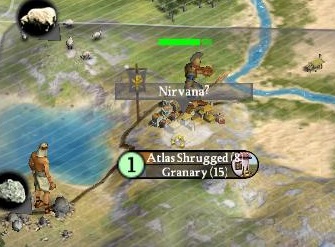 Atlas Shrugged
Atlas Shrugged is quite a long book, and is also unavoidably and distinctly American. It is an attempt to codify the mythos of rugged individualism that often flourished with the systems and the minds of old America, but were not written explicitly in its laws or customs. It is ambitious, flawed, yet striking all the same.
I won't be one of the diehard fans who pretends there is nothing in the book worth criticizing. It features a scene typical to 19th century romance novels where the woman only truly falls in love when she is forcefully carted off to bed - something déclassé even for the time in which it was written. One third of the book is dedicated to exploring the possibility of a utopia that comes across as more than a little whimsical. The ending features an infamous speech that goes on for too long, and feels like an attempt to cram in all the ideas in Ayn Rand's head that she couldn't naturally fit into the story through conversations. It's not perfect.
At its core, though, it is compelling. To understand what about it is compelling, one has to engage with the concepts in the text, and make sure to understand the concepts that are spoken. That sounds like an obvious thing, something that should be done for any book, but many of the critics of Atlas Shrugged do not seem to grant it this courtesy.
The most obvious fact supporting this is that the villains of Atlas Shrugged are not the poor. The protagonists and heroes of the book are the rich, but the villains are not the masses of the poor rising up to try and take them down. The villains of the book are, instead, middle class middle managers.
Atlas Shrugged attempts to personify the now long gone industrial heart of America in the form of great men and women. There is Dagny Taggart, a woman co-owner of one of the nation's leading rail companies. There is Hank Rearden, a man who invented a new variant of steel. There are a great many more industrial magnates, champions of oil and gas and the other things that make the metal gears of the world turn. Did you know that America once used to be the world's leading producer of steel, and that one could measure some of the most wealthy men in the country by their investments in that steel? Hard to believe now, but the world was still like that when Rand wrote the book.
But all was not well in America when Rand moved there, and neither are things in the book. A general sense of malaise envelops everything, and those great industries find themselves steadily shrinking. Not because the poor masses are revolting and demanding higher pay, but because the businesses are being strangled from above. More laws are passed each day by middle managers and government men, and each makes it harder to run a business in a sane way - one that actually produces value.
This scenario may sound dreamy, in a world where the unavoidable megacorporation rattling off a giant profit each year is taken as a given. But this is a recent invention. If one looks back further, before Ronald Reagan was in office, there were several economic crises that mirror the one in the book. There was even a president whose actions match closely that of the American government Rand writes about: Franklin D. Roosevelt, with his New Deal.
In the real world, the excesses of the New Deal never reached that of Atlas Shrugged. Roosevelt found his most far reaching plans for the economy curtailed by the Supreme Court, and the second World War eventually provided a shot in the arm for the economy that would carry it for the next few decades. But there was really a time when the government was happily strangling businesses in the name of platitudes, dragging out one recession for many more years, and even sending the secret police to sniff around in case any firm broke one of the many frivolous laws introduced in only a few years. Many Americans are not taught of the excesses of the 30s - perhaps because they are far overshadowed by the excesses that occurred in other countries. But it is a waste, still, not to know.
Another criticism commonly given is that the villains of Atlas Shrugged are too one dimensional. That they simply bleat their platitudes and beliefs like sheep, incapable of any further reasoning not first handed to them on a silver platter. At one time, I might have agreed with this myself. But then experience taught me this sort of one dimensional behavior is, for better or worse, realistic.
If the goal of good art includes being able to feel real - to show some truth of the world, then one truth of the world Rand shows is that the world is often full of people who don't have strong will or reasoning to do much besides repeating some idea that was given to them. One can look at whatever economic or psychological cause for this they want - many who detest Rand's writing will still believe this reasoning if it is applied in a different situation. They will believe that things like genocide happen only because government propaganda infects the minds of those who cannot resist it. And since this is probably the case, to some extent, there's no reason to believe that the American middle class would be exempt for this.
In the modern age, there are few practical lessons to take from Atlas Shrugged. Even if one wanted to follow or support the actual Dagnys or Reardens of the world, they no longer exist as they did in Rand's time, and nor do the businesses they ran. The economic and socio-political reality that Rand lived through has been fully eroded with time. But I would recommend that book to understand what was lost with that change.
Posts: 4,577
Threads: 31
Joined: Nov 2016
(July 14th, 2023, 16:22)greenline Wrote: Getting this done on time meant abusing Dune a lot. There's around 30 turns of whip unhappy stacked, and most of the forests burned. The good news is that this city didn't have many good tiles to work anyway, and it can still be useful working the three resource tiles and pumping workers. The workers there on site will hook the horses up, and then depart for greener pastures (hah).
Oracle tech target is Monarchy. If we land it, the question I have is when is the best time to revolt. It will be a while before we get our first golden age. Sooner rather than later? When the current wave of settlers is finished and in transit?
Will be interesting to see if Monarchy is worth the abuse. As for revolting outside a GA, it can be worth it, but you really want to be in a position to take advantage of the bonus; either because your economy is so bad there's barely any GNP loss (and the hammers aren't immediately useful), or the bonus is very strong. I don't have a strong feeling about how our situation is here.
(July 14th, 2023, 16:22)greenline Wrote: Further scouting in the east reveals Aetryn and Xist to be close neighbors. We'll probably border the two of them in this region eventually. Thankfully, the geography lends itself to having a natural chokepoint fortress. Xist was flashing a couple of axes nearby - glad I don't have to deal with that!
So we are indeed locked in two duels for the early game. Interesting map design choice, and bad news for us.
(July 14th, 2023, 16:22)greenline Wrote: The GNP graph is more interesting. Civac being at the top I suspect has some things to do with CRE culture - we are in second, despite only having a religious culture active this turn. I've laid down several cottages now. I wonder if other players are building early grass farms instead of cottages? Or is this just the PRO trade route bonus propelling us forward?
Looks like Bingvac's GNP is 9 higher than us. CREative and 6 cities is 12, and I read it as we landed Judaism this turn, so those 5 culture aren't showing up in graphs yet.
(July 14th, 2023, 16:22)greenline Wrote: Next tech is archery - I want to have PRO archers available for happy reasons as well as cheap border garrisons. After that, I believe the way to go is straight Currency -> Guilds -> pain train.
Sounds like a reasonable path.
(July 14th, 2023, 16:58)greenline Wrote: Courting potential controversy (and therefore, more posts and thread views), our future capital is named after a book that many strongly dislike, Atlas Shrugged.
I must admit I haven't read Atlas Shrugged (and have no desire to do so), but I have read Sewer, Gas and Electric, which in some ways is a satirical takedown of the book. It even features the animatronic spirit of Ayn Rand as a proverbial genie in a bottle. It's very surrealistic but also one of the funniest books I've read.
(July 14th, 2023, 16:58)greenline Wrote: In the modern age, there are few practical lessons to take from Atlas Shrugged. Even if one wanted to follow or support the actual Dagnys or Reardens of the world, they no longer exist as they did in Rand's time, and nor do the businesses they ran. The economic and socio-political reality that Rand lived through has been fully eroded with time. But I would recommend that book to understand what was lost with that change.
I doubt they even existed in Ayn Rand's time, if they ever did. Given that this is an American-centric site and this is not the political forum, I'll limit my comments to saying that American exceptionalism is not a positive feature.
Posts: 2,075
Threads: 20
Joined: Dec 2014
We have landed Oracle!
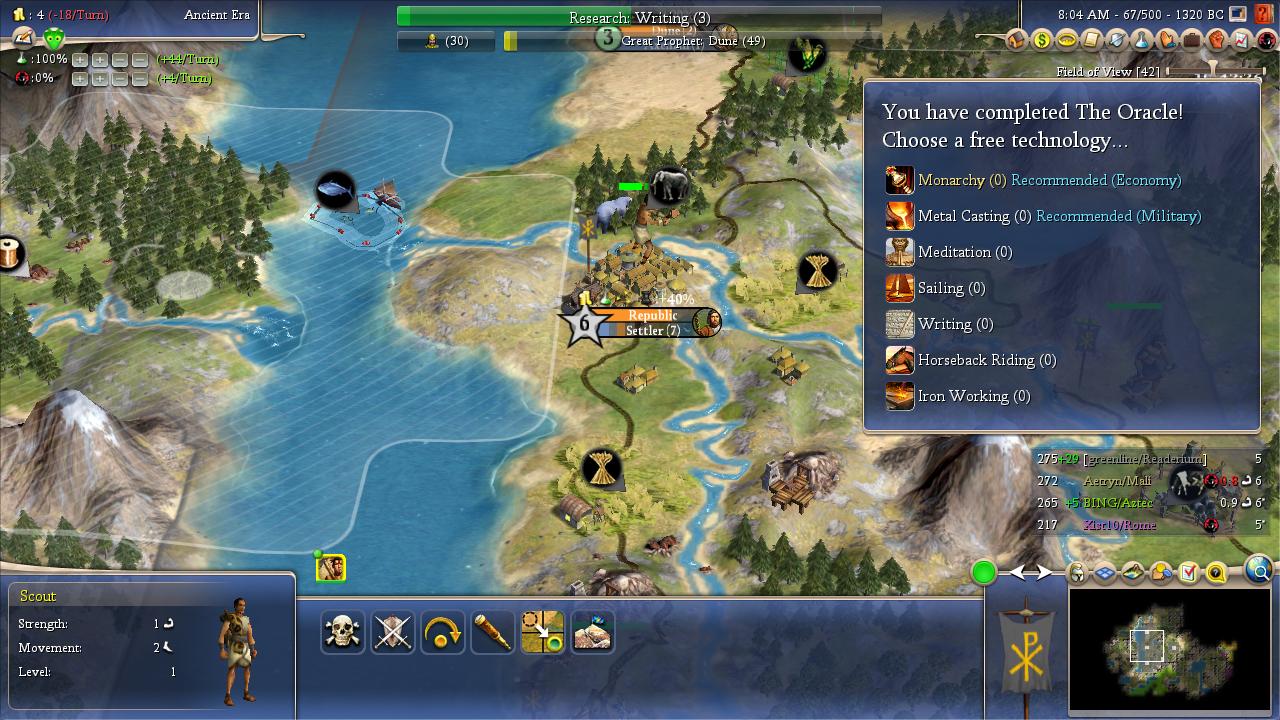
Seeing the pop up, I was tempted to just splurge on metal casting. But we can't afford any forges right now, all the whips are desperately needed to produce workers and settlers. So we grab monarchy.
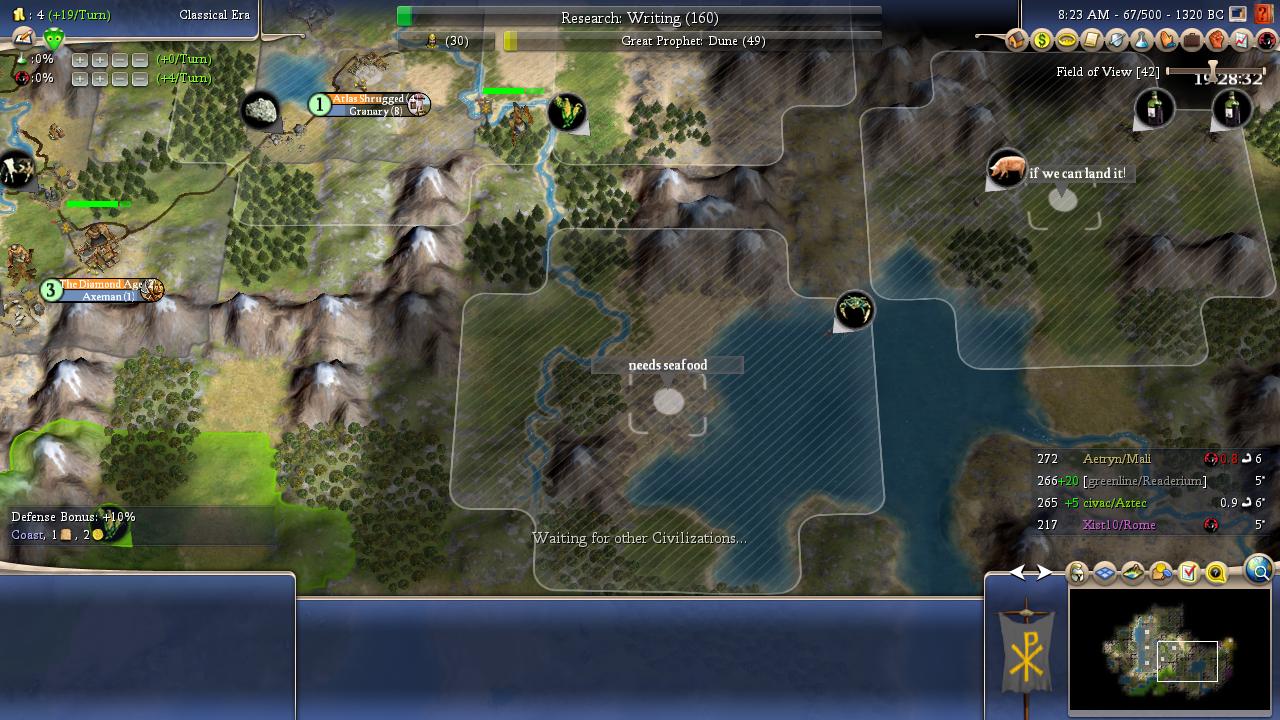
Our settler is en route to grab the 'needs seafood spot' or to settle closer on the corn. I'm a bit leery of going for the seafood spot with a small escort. There is a couple of axes trailing behind, but I kind of feel like just settling the more defensive spot to bring in the corn faster. The seafood spot only really grabs a second ring crab, and this way would let us share and grow cottages for the future capital faster. And Bing is our #1 enemy, so I'd rather have any front cities focus on being defensible first.
(July 15th, 2023, 01:03)Tarkeel Wrote: Will be interesting to see if Monarchy is worth the abuse. As for revolting outside a GA, it can be worth it, but you really want to be in a position to take advantage of the bonus; either because your economy is so bad there's barely any GNP loss (and the hammers aren't immediately useful), or the bonus is very strong. I don't have a strong feeling about how our situation is here.
Our economy is still decently strong at the moment, but it will take somewhat of a beating once the next few cities are settled. I do want to be able to take advantage of HR sooner rather than later - our cities are really hurting for luxuries, and there's no precious metals or fur in sight. Just a couple of calendar resources. Plus, OR will let the missionary spam begin to save monument hammers. Maybe once all the settlers are complete?
Quote:So we are indeed locked in two duels for the early game. Interesting map design choice, and bad news for us.
Yeah. I am worried superdeath will nudge Xist into a suicide praet attack on Aetryn, and this will leave us as the lone player to try and stop Bing.
Quote:I must admit I haven't read Atlas Shrugged (and have no desire to do so), but I have read Sewer, Gas and Electric, which in some ways is a satirical takedown of the book. It even features the animatronic spirit of Ayn Rand as a proverbial genie in a bottle. It's very surrealistic but also one of the funniest books I've read.
Interesting. It reminds me somewhat of the Hitchhiker's Guide to the Galaxy, or Terry Pratchett's stuff. I used to be more in the mood for satire, but I feel like I've read so much in my youth that I've now had my fill.
Quote:I doubt they even existed in Ayn Rand's time, if they ever did. Given that this is an American-centric site and this is not the political forum, I'll limit my comments to saying that American exceptionalism is not a positive feature.
I don't think American Exceptionalism is how I would describe it. But I can certainly see how that interpretation would seem distasteful.
|


